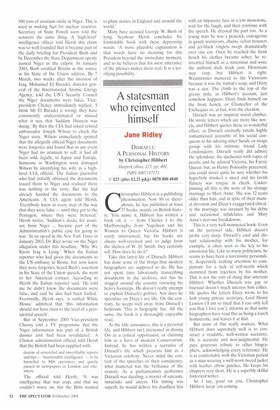A statesman who reinvented himself
Jane Ridley
DISRAELI: A PERSONAL HISTORY by Christopher Hibbert HarperCollins, £25, pp. 401, ISBN 0007147171 (t) £23 (plus £2.25 p&p) 0870 800 4848 Christopher Hibbert is a publishing phenomenon. Now 80 or thereabouts, he has published at least 37 books, mainly on British history. You name it, Hibbert has written a book on it — from Charles I to the Marlboroughs, from Napoleon and his Women to Queen Victoria. Hibbert is rarely interviewed, but his books are always well-received and, to judge from the shelves of W. H. Smith, they certainly sell. How does he do it?
Take this latest life of Disraeli. Hibbert has done none of the things that modern biographers are supposed to do. He has not spent time laboriously transcribing documents in the archives, nor has he slogged around the country retracing his hero's footsteps. He doesn't really attempt to explain Disraeli's politics. Nor does he speculate on Dizzy's sex life. On the contrary, he keeps well away from Disraeli's bedroom. This is biography lite. All the same, the book is a thoroughly enjoyable read.
As the title announces, this is a personal life, and Hibbert isn't interested in dissing Dis as a cynical opportunist, or claiming him as a hero of modern Conservatism. Instead, he has written a narrative of Disraeli's life which presents him as a Victorian celebrity. Never mind the content of the speeches or their consistency, what mattered was the brilliance of the oratory. As a parliamentary performer Disraeli was dazzling, a master of sarcasm, innuendo and sneers. His timing was superb; he would deliver his deadliest hits
with an impassive face in a low monotone, wait for the laugh, and then continue with the speech. He dressed the part too. As a young man he was a peacock, outrageous in gaudy waistcoats, chains, velvet trousers and jet-black ringlets swept dramatically over one ear. Once he reached the front bench his clothes became sober; he reinvented himself as a statesman and wore the uniform dark frock coat. Historians may carp, but Hibbert is right: Westminster mattered to the Victorians because it was the nation's soap, and Dizzy was a star. The climb to the top of the greasy pole, in Hibbert's account, just somehow happens: Dizzy finds himself on the front bench, or Chancellor of the Exchequer or, at last, wins the election.
Disraeli was an inspired social climber. He wrote letters which are more like novels, and Hibbert quotes these to wonderful effect, as Disraeli excitedly retails highly romanticised accounts of his social conquests to his adoring sister Sarah, or swaps gossip with his intimate friend Lady Londonderry. Disraeli really did admire the splendour, the duchesses with ropes of pearls, and he adored Victoria, his Faerie Queen; but, as Henry Ponsonby perceived, you could never quite be sure whether his hyperbole masked a sneer and his lavish flattery was tongue in cheek. Underpinning all this is the story of his strange marriage to Mary Anne. She was 12 years older than him, and in spite of their mutual devotion and Dizzy's exaggerated chivalry the marriage was strained by his debts and occasional infidelities and Mary Anne's nervous breakdowns.
This is a very well-mannered book. Even on the personal side, Hibbert doesn't probe very deep. Disraeli's cool and distant relationship with his mother, for example, is often seen as the key to his emotional life. Like so many politicians, he seems to have been a narcissistic personality, desperately seeking attention to compensate for a lack of self-worth which stemmed from rejection by his mother. This is not the sort of thing that interests Hibbert. Whether Disraeli was gay or bisexual doesn't much interest him either. He quotes the letters Dizzy wrote to his lush young private secretary, Lord Henry Lennox (1 am so tired that 1 can only tell you that I love you'), informs us that sonic biographers have read this as being a touch homoerotic, and leaves it at that.
But none of this really matters. What Hibbert does supremely well is to construct a readable, well-written narrative. He is accurate and non-judgmental. He pays generous tribute to other biographers, acknowledging every reference. He is as comfortable with the Victorian period as a man wearing a well-worn tweed jacket with leather elbow patches. He keeps his chapters very short. He is a superbly skilful historical writer.
So I say, good on you, Christopher Hibbert, keep 'em coming,


















































































































 Previous page
Previous page